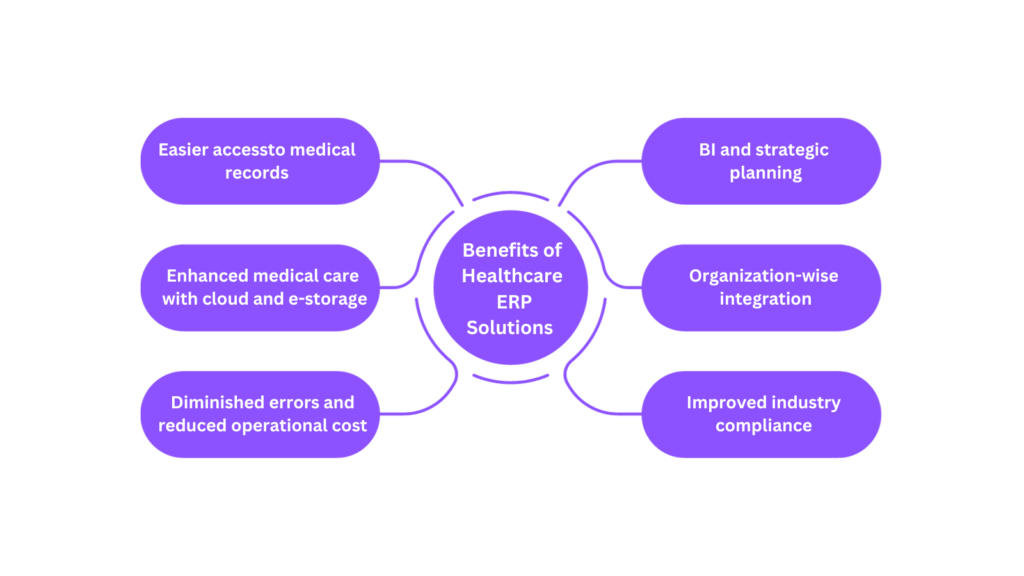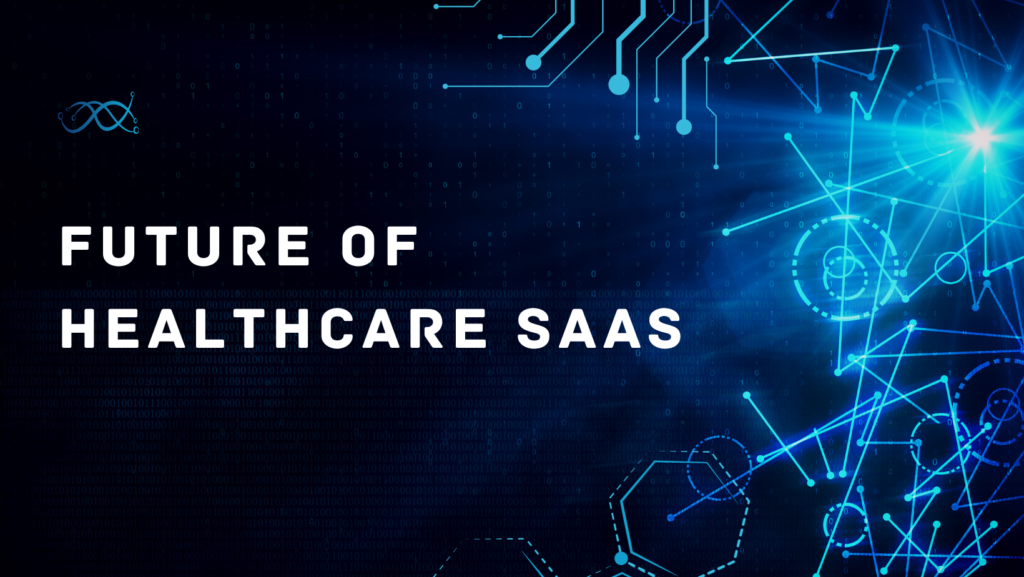The advancement of healthcare technology has not only broadened the scope of medical treatments but has also digitally revolutionized operational and clinical processes. With enhanced technology and affordable medical solutions, healthcare enterprises now need to optimize their internal information flow and communications to deliver effective care. This is where Enterprise Resource Planning (ERP) in healthcare becomes essential.
Healthcare ERP software solutions have garnered widespread acceptance owing to their robust features and capacity to deliver high-quality patient care while maintaining cost-effectiveness in operations. Rooted in business process management software, hospital ERP facilitates the integration of diverse operational aspects into a single database, user interface, and application.
This underscores the projection that the worldwide market for Enterprise Resource Planning solutions is expected to surpass $100.7 billion by 2025. It is important to highlight that, when compared to alternative IT healthcare solutions like the development of medical apps, hardware devices, and data care systems, ERP solutions demonstrate a more stable growth trajectory, indicative of substantial and sustained demand.
If you’ve decided to embark on digital transformation for your healthcare enterprise, the next step is to adopt healthcare ERP solutions to drive innovation in processes. Simultaneously, explore the business requirements, practical applications, and advantages of integrating ERP into your healthcare business by delving into the ERP business needs, use cases, and benefits outlined here.
What is an ERP system in healthcare?
An ERP system in healthcare, also known as Enterprise Resource Planning, is a technological software solution that comprises modules created to monitor data and enhance communication among various departments.
In addition to this, ERP healthcare solutions aid businesses in automating operations, dismantling data silos, streamlining information, and making informed decisions based on insights.
Role of ERP systems in Healthcare Business
The involvement of ERP systems in Healthcare Business is pivotal. ERP for healthcare proves advantageous in overseeing fundamental business processes, including HR, finances, customer relationships, inventory, and more. Healthcare establishments typically face the dual challenge of meeting two key objectives:
- Providing quality care to patients.
- Delivering quality care at a reduced cost.
For this reason, medical institutions consistently seek to upgrade ERP systems to enhance the accessibility of patient care. The crucial function of ERP in hospital management systems is to eradicate clinical errors, enhance operational efficiency, and facilitate data analytics alignment for improved productivity.
Applications and Benefits of Healthcare ERP Solutions
The fundamental need for an ERP solution in your healthcare organization goes beyond addressing mere clinical and administrative requirements. The sustainability of ERP solutions in healthcare is rooted in their ability to deliver superior care both internally and externally, manage costs effectively, yield improved outcomes, and enhance overall operational efficiency. What’s more?
Here are six key advantages of integrating healthcare ERP systems into your business:

1. Easier access to medical records
Seamless access to medical records is essential for healthcare staff, patients, and medical professionals to make informed operational decisions and schedule appointments as needed. Traditional software systems lacked this functionality, but the transition to automated ERP solutions enables instant access to crucial data with a single click, markedly enhancing the patient experience. Studies indicate that organisations adopting or updating their ERPs demonstrate notable productivity advantages over their counterparts. ERP systems played a substantial role in alleviating the considerable data management challenges faced by hospitals in the post-pandemic period.
Furthermore, utilising ERP systems to monitor and update details such as oxygen levels, blood pressure, body temperature, and other vital indicators facilitates prompt assistance to patients.
2. Enhanced medical care with cloud and e-storage
The utilisation of cloud ERP in healthcare enables healthcare professionals to access information remotely. This ensures that even when doctors are not physically present, they can provide medical recommendations based on updated patient data. It’s worth noting that robust ERP solutions in healthcare ensure the availability of critical patient information across various systems.
3. Diminished errors and reduced operational cost
Efficient financial management is crucial for healthcare businesses. ERP software systems, equipped with accounting modules, are tailored to store and record various monetary transactions. Healthcare ERP systems are specifically designed to oversee the comprehensive financial process, tracking expenses, income, and assets within your business.
An ERP-based financial management system provides financial visibility and accounting information. Hospital ERP systems leverage advanced technologies like AI analytics and machine learning to safeguard confidential medical data against security threats.
4. BI and strategic planning
ERP systems serve as invaluable tools for creating robust strategic plans and gaining precise insights. Healthcare ERP solutions also possess the capability to gauge institutional healthcare performance, providing information on budgeting, patient visits, requisitions, and other relevant data. Business Intelligence tools in healthcare aid in analysing data to pinpoint areas that require improvement.
Upon identifying these areas, effective strategies can be readily recognized and implemented.
5. Organization-wise integration
The utilisation of various healthcare solutions and devices for managing hospital operations can often lead to complex and costly maintenance. From financial processes to human resources, billing, and record-keeping, a healthcare ERP system ensures the streamlining of all operations and centralized data storage in a unified database.
Also Read- Resurrecting Patient Care With Legacy Systems in Healthcare
6. Improved industry compliance
Healthcare stands out as a sector with a critical need for adhering to standardised compliance protocols. Failure to comply with health standards may expose your healthcare business to substantial fines and reputational damage, potentially resulting in severe consequences for patients.
The initial move towards achieving compliance in the healthcare industry involves ensuring that your operations maintain security, transparency, and traceability. This process can commence by adhering to outdated record-keeping methods and legacy systems, successfully passing audits, and proactively upgrading software systems.
Healthcare ERP simplifies the retrieval of necessary documents, providing accessibility regardless of your location.
How Healthcare ERP Solutions Keeps Your Business Scalable
As predicted by Gartner, the culmination of 2022 is expected to witness a shift towards adaptability and agility in product service demands, emphasizing elasticity. This holds significant benefits for the healthcare sector, as over 75% of enterprise technology and service acquisitions are anticipated to align with these top three criteria.
No industry necessitates adaptability more than healthcare, particularly considering the evolving federal and state regulations governing care. Compounded by fluctuating reimbursement rates and regulatory changes, there is a demand for software and systems that can seamlessly accommodate evolving medical processes without compromising accuracy.
Historically, the healthcare sector has grappled with inefficiencies in technical procedures and delivering quality care, resulting in inaccurate operational data, susceptibility to security breaches, and limited insights across various application platforms.
A comprehensive solution to address these challenges is healthcare ERP. Purpose-built to alleviate operational burdens, ERP solutions contribute to smoother workflows, increased revenue, and enhanced predictability for both you and your medical staff.
Additionally, through the integration of ERP in healthcare, your business can establish a consistent infrastructure capable of adapting to both current and upcoming healthcare trends.
You may also consider investigating the costs associated with developing ERP software for your healthcare business.
How Can Digiatto It Services Help Your Healthcare Business with ERP Solutions?
Digiatto IT Services is a leading software development company offering top-notch healthcare software development services to elevate the standard of medical care. Renowned for empowering dynamic medical ecosystems, we provide advanced solutions in healthcare application development.
Explore our comprehensive range of healthcare services, encompassing:
- Integration of ERP
- Telehealth applications
- Electronic Health Record (EHR)
- Prescription solutions
- Process management
- Patient engagement software
- Medical insurance claim processing
- Laboratory management
- Patient gateway
- Lifestyle tracking, and more
Connect with our healthcare experts to initiate the process now!
FAQs
Q. In what ways does ERP improve healthcare patient care?
ERP contributes to the enhancement of healthcare patient care by enabling swift access to accurate patient records, optimizing appointment scheduling, improving staff communication, and establishing a more structured and effective patient experience.
Q. Which modules are usually included in an ERP for healthcare?
Standard modules found in ERP for healthcare encompass HR, financial management, inventory management, billing, and patient management. These modules collectively streamline and integrate diverse aspects of healthcare operations.
Q. Can ERP be customized for unique healthcare needs?
ERP can be personalised to align with the distinctive needs of healthcare organisations. This ensures that the ERP solution precisely conforms to the operational structures, legal regulations, and workflows inherent in the healthcare environment. Customization enhances the adaptability of ERP, enabling it to address specific compliance requirements, integrate seamlessly with existing systems, and accommodate tailored processes in patient care.
This flexibility empowers healthcare providers to optimize their operations more effectively, resulting in a streamlined and tailored experience that caters to the unique demands of the healthcare setting.


